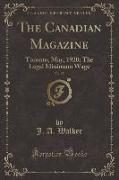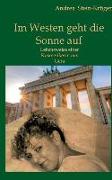The Canadian Magazine, Vol. 55
BücherAngebote / Angebote:
Excerpt from The Canadian Magazine, Vol. 55: Toronto, May, 1920, The Legal Minimum Wage
The idea of regulating wages bylaw is not in any sense a novel one nor peculiar to the period in which we live. This will be apparent from a consideration of certain aspects of the economic history of England, previous to the beginning of the nineteenth century. Before the Norman Conquest and for a long time afterwards the manor was the great institution around which the economic life of England centred. The lord owned all the land in the neighborhood of his manor, and under him was a body of serfs. The amount of services rendered by the serfs to the lord of the manor, and the remunerations given for these services, were not matters of free contract but of custom and manorial regulation. As time went on a new class arose in the economic life of the country, comprising the artisans who, as the name implies, did not cultivate the soil, but manufactured articles for general use. Large numbers of this class, having been brought up under the influence of manorial custom, felt in their new pursuits that their constantly increasing numbers made necessary some sort of regulation such as that to which they had grown accustomed, and herein we find the motive for the establishment of the first Merchant Guilds. These organizations regulated the conditions under which their members work ed, the quality of the product turned out, and the price which they were to receive for it. But the one central purpose of all these regulations was to secure for members a sufficient income.
At a later period, as greater numbers of unpropertied workmen flocked to the towns and cities, the Merchant builds became more and more exclusive, the idea being to prevent the different trades from becoming overcrowded. Bitter feeling was thus developed between the Merchant Guilds and the craftsmen who were debarred membership, and this feeling found impression in the rise of a new organization known as the Craft Guild. As in the case of the older Guild, the main object of the new one was to enable each craftsman to earn a livelihood by the exercise of his trade. History repeated itself in the desire for self-preservation, and the Craft Guild became in time as exclusive as the older brotherhood had been.
It need not be emphasized that among the excluded workers in those years there existed no semblance of organization, no means of enforcing legitimate demands. Still, these did not fail to take advantage of such opportunities as the times afforded to improve their conditions. The havoc wrought by the awful plague of 1348 afforded a unique opportunity for self-assertion. Taking advantage of the scarcity of labour created by the epidemic, they demanded increased wages. But the employers refused such increases and even prevailed upon Parliament to pass a law known as The Statute of Labourers (Anno. 25, Edward III, Statute 1, A.D. 1350). The preamble of this bill runs thus: Whereas late against the malice of servants, which were idle and not willing to serve after the pestilence without taking excessive wages, it was ordained by our Lord the King, and by assent of the prelates, earls, barons and others of his Council, that such manner of servants as well as men and women should be bound to serve, receiving salary and wages accustomed in places where they ought to serve, in the Twentieth year of the reign of the King that now is. The scale of wages was set forth for the various occupations, and the sheriffs, justices and mayors were authorized to enforce them. Note that this enactment fixed a maximum, not a minimum wage, for it aimed to prevent the worker from receiving more and the employer from paying more than the rates prevailing before the plague. The Statute, however, failed of its purpose, for wages increased despite the appeals of the employers for further legislation to keep them down.
Folgt in ca. 5 Arbeitstagen




